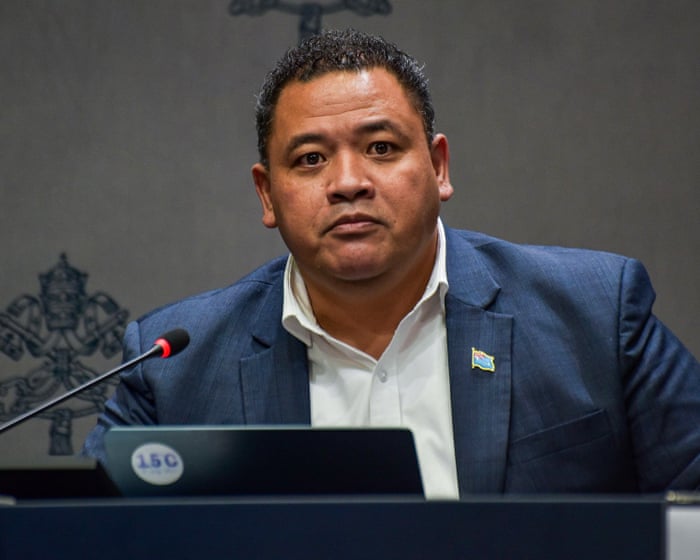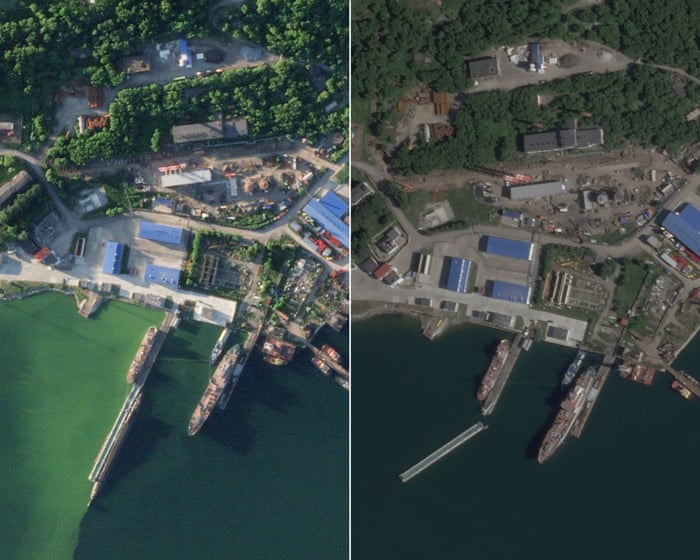At the critical UN climate talks in Belém, Brazil, representatives from 193 countries gathered, but only one had the courage to step forward and openly criticize the absent and hostile Trump administration: the climate minister of the small island nation of Tuvalu.
On Monday, Maina Vakafua Talia addressed leaders and diplomats at the Cop30 summit, stating that Donald Trump had shown a “shameful disregard for the rest of the world” by pulling the U.S. out of the Paris climate agreement.
Despite Trump not sending a delegation to the meeting, his presence was strongly felt. Talia’s public condemnation stood out against the mostly private concerns of other delegations, who were alarmed by U.S. efforts to block climate action but feared retaliation from the White House.
“We can’t stay silent while our islands are sinking. We can’t stay silent while our people are suffering,” Talia declared. Tuvalu, a nation of atolls and reef islands in the South Pacific, is highly vulnerable to rising sea levels and stronger storms caused by the climate crisis.
“The U.S. has withdrawn from the Paris climate agreement, and I believe that’s shameful,” he said. “We look to the U.S. for leadership and peace, but they seem to be moving in the opposite direction, and we must hold them accountable. Just because the U.S. is a larger country doesn’t mean we should be quiet. Our survival is what matters.”
Trump has repeatedly expressed his contempt for the climate crisis, labeling it a “con job” and a “hoax.” He has rolled back environmental regulations and clean energy initiatives in the U.S. and encouraged other nations to rely on fossil fuels. In a UN speech in September, he warned leaders, “If you don’t get away from this green scam, your country is going to fail.”
“You need strong borders and traditional energy sources to be great again… All those UN predictions are wrong, made by foolish people,” he added.
Last month in London, the U.S. aggressively intervened to block a plan to cut international shipping emissions, reportedly threatening diplomats from other countries during breaks at the International Maritime Organization to get its way. Although no U.S. delegates are present at the current UN climate talks—a first—some negotiators fear similar tactics could occur.
“I think countries are afraid to speak out because, especially smaller, vulnerable nations, they never know when an unexpected tariff hike might hit,” said Farhana Yamin, a British lawyer and activist who helped design the Paris climate agreement.
“Countries have seen U.S. aid cut, and they lack the resources to respond. So there’s likely a sense of self-censorship being imposed.”
Yamin added that while Trump can’t completely stop the global shift to cleaner energy, nations are still facing a “powerful, very vitriolic, and at times frightening backlash.”
California Governor Gavin Newsom visited Cop30 and called Trump an “invasive species” and a “wrecking ball,” but non-American delegates were more cautious. Several approached for comment on the U.S. climate stance either avoided the topic or gave neutral, diplomatic answers.
“I believe the American people made a democratic choice,” said Juan Carlos Monterrey, Panama’s climate negotiator. “They’re a sovereign nation, right? And that should be respected.”
Privately, however, some negotiators admitted they are being careful to avoid provoking a negative reaction from Trump. “Please don’t quote me saying anything about the U.S.; I don’t want them to invade my country or something,” one said.
Tuvalu’s Talia doesn’t share these fears, noting that the Trump administration has already cut climate adaptation funding for his island.He said that he watched Trump’s speech to the UN in September and found it “entertaining.”
“The president is imposing sanctions and levies—but for us, we have nothing to trade with the US,” he said. “This is a moral crisis. He has a moral duty to act; the world is watching him, watching the US.
“We listen to the president of the United States. We hoped to find reasons for optimism and possible solutions, but instead we heard only doom. It condemned us and our ability to survive. We need the US involved. We need them to engage.”
Christiana Figueres, the former UN climate chief, said the Trump administration is treating multilateral politics like “two- and three-year-olds” who cause a ruckus while “playing house.” She added, “It is completely immature, irresponsible, and very sad for the United States.”
Figueres has stated that it would be better for the US not to attend Cop30 rather than be there and disrupt the process, although some form of Trump-style intervention could still happen in the second week of the summit as an agreement nears. Countries will be discussing issues like climate finance and a phase-out of fossil fuels, which the US or aligned allies such as Saudi Arabia might try to block.
California governor calls Trump ‘an invasive species’ at Cop30 climate talks
Read more
“They don’t even need to be in the negotiations,” said Susana Muhamad, former environment minister of Colombia, referring to the US. “If there is an outcome that affects their interests, they will react. And they have the power to react, as they’ve shown in the IMO [maritime] process.”
When asked whether the US can rebuild its declining reputation globally, Rhode Island senator Sheldon Whitehouse, the only US federal official at Cop30, said that depends on Americans realizing that Trump’s fossil fuel policies are worsening an affordability crisis. He explained that the president’s attacks on necessary clean energy are driving up utility bills, while climate-driven extreme weather is increasing home insurance rates.
“The sooner Americans understand this, and the sooner they see the Republican party’s complicity in it, the sooner we can make the political correction so we no longer have a government we have to apologize for,” he said.
Frequently Asked Questions
Of course Here is a list of FAQs about Tuvalu condemning a political leaders stance at a climate conference framed in a natural conversational tone
Basic Understanding
1 What is Tuvalu and why are we hearing about it
Tuvalu is a small island nation in the South Pacific Ocean Its in the news because it is one of the countries most threatened by climate change and rising sea levels
2 What is COP30
COP30 stands for the 30th Conference of the Parties Its a major United Nations climate change conference where world leaders meet to negotiate global action on climate change Its scheduled to be held in 2025
3 Who did Tuvalu condemn and what for
Tuvalu condemned a political figure for their shameful disregard for climate action This is a hypothetical scenario based on past events criticizing a leader for not taking the climate crisis seriously or for withdrawing from international agreements
4 What does shameful disregard mean in this context
It means Tuvalus government believes the leader is acting irresponsibly and ignoring the urgent threat of climate change which is an existential crisis for their nation
Deeper Context and Impact
5 Why does Tuvalu feel so strongly about this
Because Tuvalu is only a few meters above sea level Rising sea levels from climate change threaten to submerge the entire country making its people climate refugees For them climate inaction is a direct threat to their survival
6 What power does a small country like Tuvalu have in these big conferences
While its not a military or economic superpower Tuvalu holds significant moral authority It represents the canary in the coal mine for climate change giving a powerful voice to the most vulnerable nations and reminding larger countries of their responsibility
7 Has something like this happened before
Yes similar condemnations and strong statements have occurred For instance many island nations and world leaders criticized the US withdrawal from the Paris Agreement under a previous administration calling it a betrayal of global efforts
8 What does Tuvalu want to achieve by speaking out so forcefully
They aim to shame larger nations into taking more aggressive climate action honor their financial commitments to help vulnerable countries adapt and keep the global focus on the immediate dangers faced



